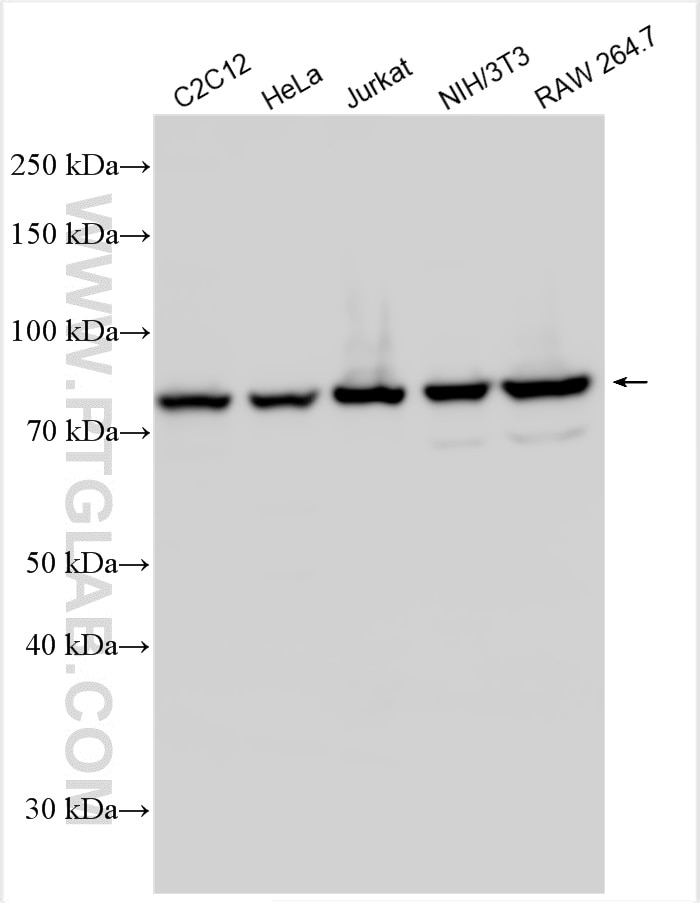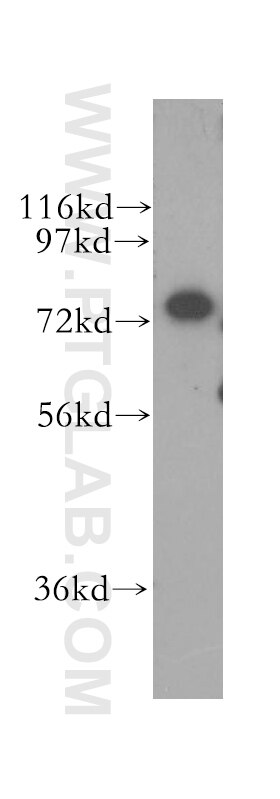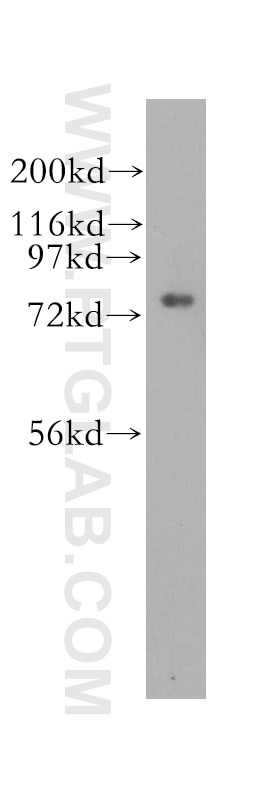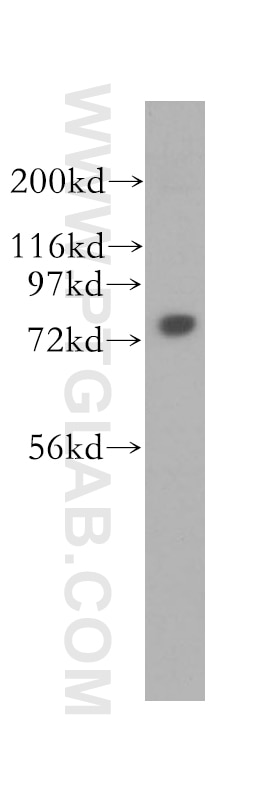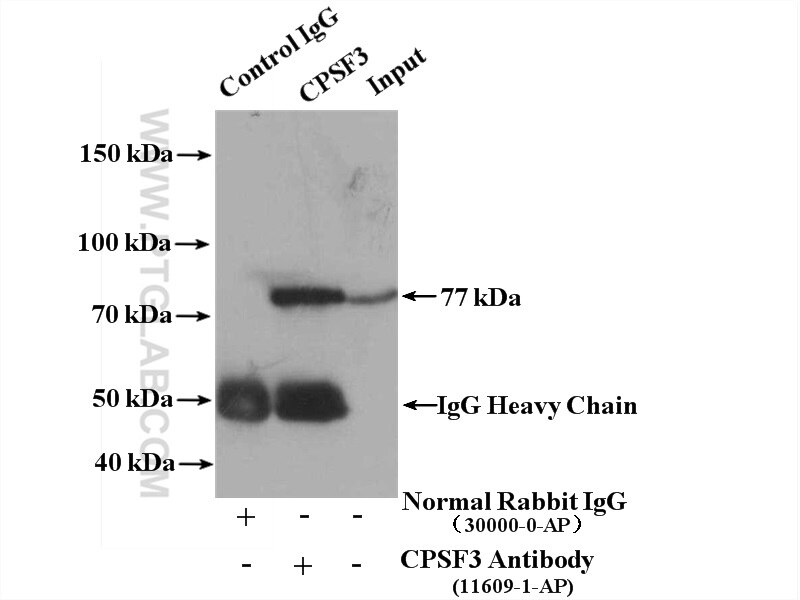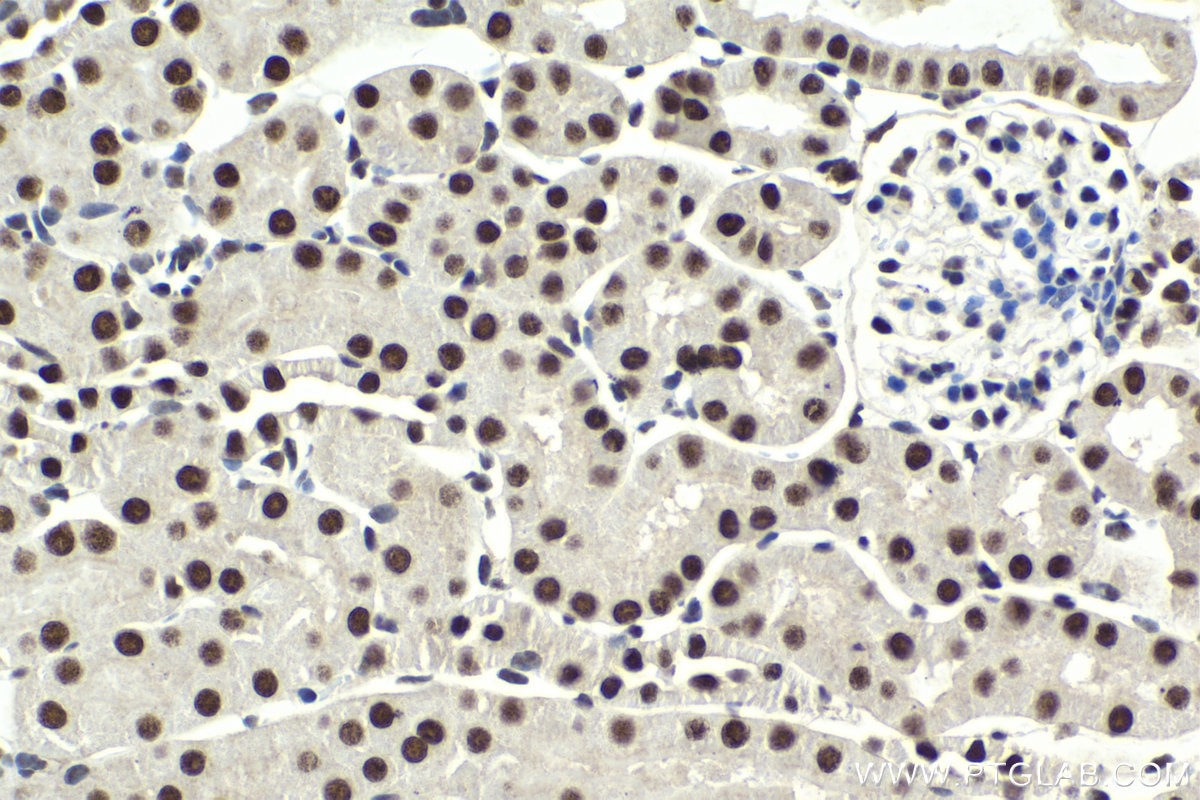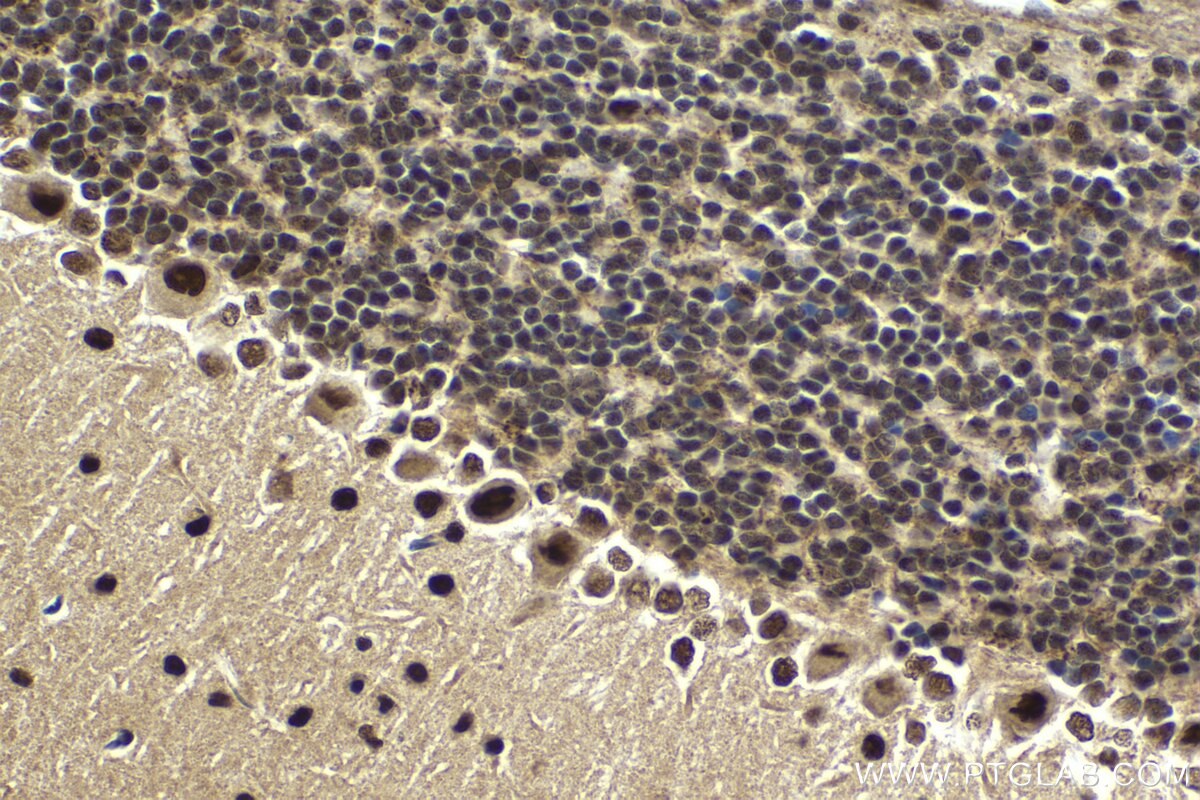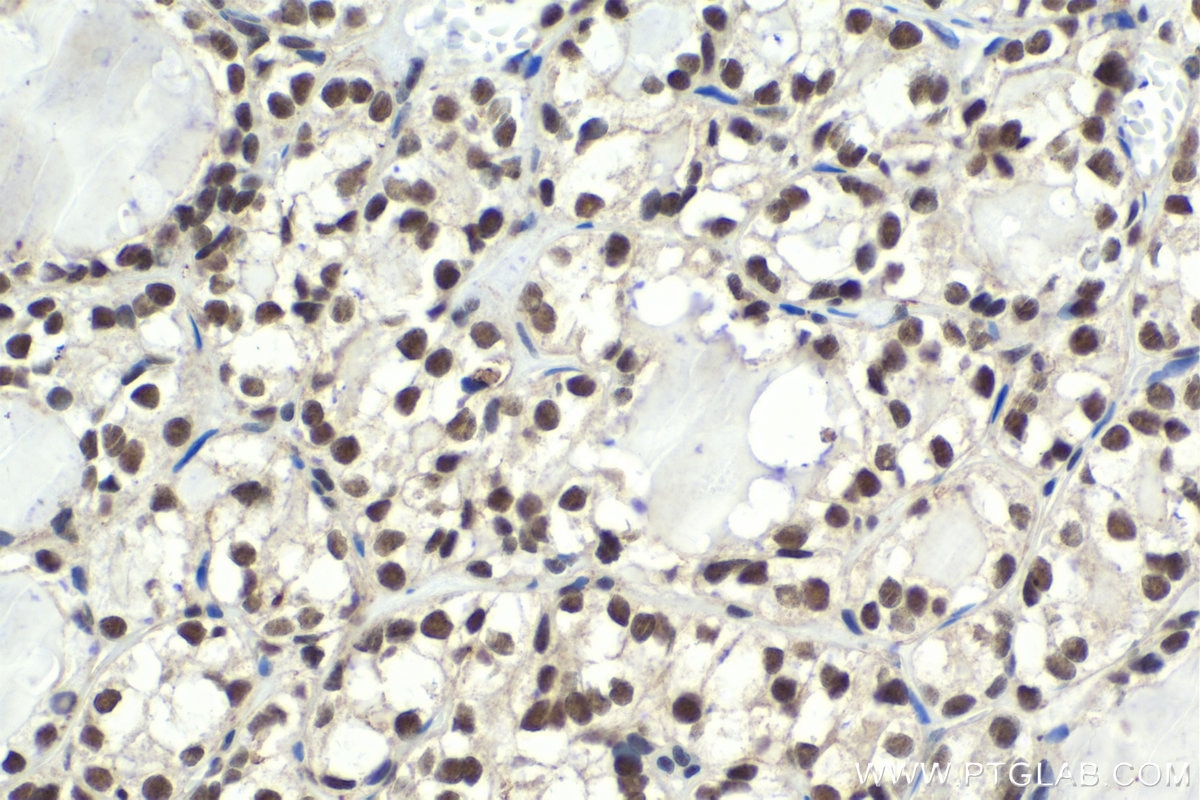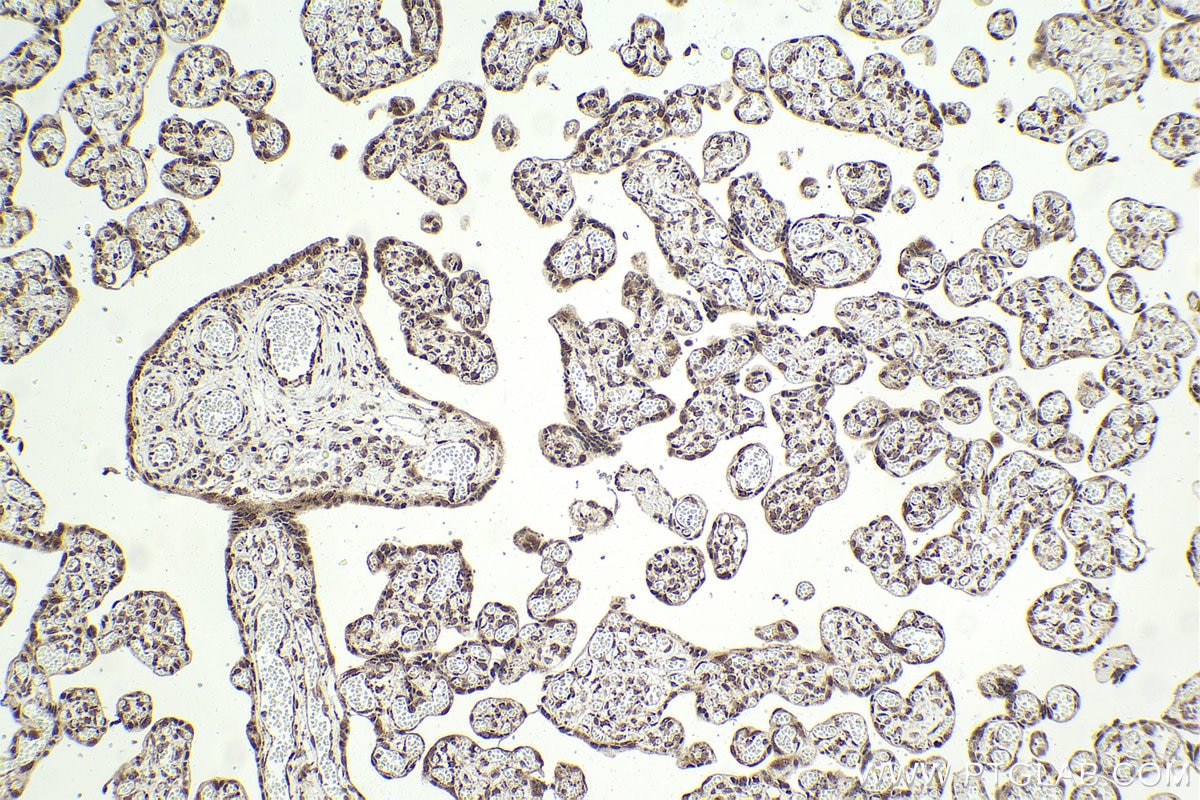Validation Data Gallery
Tested Applications
| Positive WB detected in | C2C12 cells, HEK-293 cells, HepG2 cells, human brain tissue, HeLa cells, Jurkat cells, NIH/3T3 cells, RAW 264.7 cells |
| Positive IP detected in | HEK-293 cells |
| Positive IHC detected in | mouse kidney tissue, human placenta tissue, human thyroid cancer tissue, mouse cerebellum tissue Note: suggested antigen retrieval with TE buffer pH 9.0; (*) Alternatively, antigen retrieval may be performed with citrate buffer pH 6.0 |
Recommended dilution
| Application | Dilution |
|---|---|
| Western Blot (WB) | WB : 1:1000-1:4000 |
| Immunoprecipitation (IP) | IP : 0.5-4.0 ug for 1.0-3.0 mg of total protein lysate |
| Immunohistochemistry (IHC) | IHC : 1:500-1:2000 |
| It is recommended that this reagent should be titrated in each testing system to obtain optimal results. | |
| Sample-dependent, Check data in validation data gallery. | |
Published Applications
| KD/KO | See 2 publications below |
| WB | See 7 publications below |
Product Information
11609-1-AP targets CPSF3 in WB, IHC, IP, ELISA applications and shows reactivity with human, mouse samples.
| Tested Reactivity | human, mouse |
| Cited Reactivity | human, pig |
| Host / Isotype | Rabbit / IgG |
| Class | Polyclonal |
| Type | Antibody |
| Immunogen |
CatNo: Ag2173 Product name: Recombinant human CPSF3 protein Source: e coli.-derived, PGEX-4T Tag: GST Domain: 337-684 aa of BC020211 Sequence: SRELFESWCTDKRNGVIIAGYCVEGTLAKHIMSEPEEITTMSGQKLPLKMSVDYISFSAHTDYQQTSEFIRALKPPHVILVHGEQNEMARLKAALIREYEDNDEVHIEVHNPRNTEAVTLNFRGEKLAKVMGFLADKKPEQGQRVSGILVKRNFNYHILSPCDLSNYTDLAMSTVKQTQAIPYTGPFNLLCYQLQKLTGDVEELEIQEKPALKVFKNITVIQEPGMVVLEWLANPSNDMYADTVTTVILEVQSNPKIRKGAVQKVSKKLEMHVYSKRLEIMLQDIFGEDCVSVKDDSILSVTVDGKTANLNLETRTVECEEGSEDDESLREMVELAAQRLYEALTPVH 相同性解析による交差性が予測される生物種 |
| Full Name | cleavage and polyadenylation specific factor 3, 73kDa |
| Calculated molecular weight | 684 aa, 77 kDa |
| Observed molecular weight | 77 kDa |
| GenBank accession number | BC020211 |
| Gene Symbol | CPSF3 |
| Gene ID (NCBI) | 51692 |
| RRID | AB_2292188 |
| Conjugate | Unconjugated |
| Form | |
| Form | Liquid |
| Purification Method | Antigen affinity purification |
| UNIPROT ID | Q9UKF6 |
| Storage Buffer | PBS with 0.02% sodium azide and 50% glycerol{{ptg:BufferTemp}}7.3 |
| Storage Conditions | Store at -20°C. Stable for one year after shipment. Aliquoting is unnecessary for -20oC storage. |
Background Information
CPSF3 (cleavage and polyadenylation specificity factor 3) is involved in human disease and is the putative target of benzoxaboroles in trypanosomatid parasites and Cryptosporidium infection. CPSF3 has also been associated with cancer malignancy in that CPSF3 induces cell cycle arrest in hepatocellular carcinoma and promotes lung adenocarcinoma cell proliferation and metastasis (PMID: 38718887). CPSF3 has been implicated in various cancers, including lung cancer, colorectal, prostate, and triple-negative breast cancers (PMID: 37627085).
Protocols
| Product Specific Protocols | |
|---|---|
| IHC protocol for CPSF3 antibody 11609-1-AP | Download protocol |
| IP protocol for CPSF3 antibody 11609-1-AP | Download protocol |
| WB protocol for CPSF3 antibody 11609-1-AP | Download protocol |
| Standard Protocols | |
|---|---|
| Click here to view our Standard Protocols |
Publications
| Species | Application | Title |
|---|---|---|
J Exp Clin Cancer Res LncRNA CASC9 interacts with CPSF3 to regulate TGF-β signaling in colorectal cancer.
| ||
Cancers (Basel) CPSF3 Promotes Pre-mRNA Splicing and Prevents CircRNA Cyclization in Hepatocellular Carcinoma | ||
Cell Rep Proteomics reveal cap-dependent translation inhibitors remodel the translation machinery and translatome. | ||
Cell Discov RBBP6 maintains glioblastoma stem cells through CPSF3-dependent alternative polyadenylation
| ||
Cell Chem Biol Anticancer benzoxaboroles block pre-mRNA processing by directly inhibiting CPSF3 | ||
Mol Cell Mediator regulates transcriptional termination through crosstalk with pre-mRNA 3' end processing factors |

